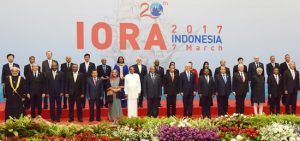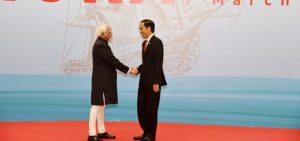 It’s better late than never. The 21-nation grouping straddling the strategically vital Indian Ocean stretching from South Africa to Australia and including India was set up two decades ago, but the first summit-level meeting of leaders of the countries was held in Jakarta only on March 7, 2017. By contrast, the Summits of leaders around the Atlantic and Pacific Ocean are commonplace. By all accounts, the IORA Summit was immensely productive. It came out with three documents—the Jakarta Concord, an action plan and a Declaration on countering violent extremism leading to terrorism.
It’s better late than never. The 21-nation grouping straddling the strategically vital Indian Ocean stretching from South Africa to Australia and including India was set up two decades ago, but the first summit-level meeting of leaders of the countries was held in Jakarta only on March 7, 2017. By contrast, the Summits of leaders around the Atlantic and Pacific Ocean are commonplace. By all accounts, the IORA Summit was immensely productive. It came out with three documents—the Jakarta Concord, an action plan and a Declaration on countering violent extremism leading to terrorism.
Indonesian President and current IORA Chairman Joko Widodo described the Indian Ocean the “future” of Asia. And why not? For the IOR is home to 2.7 billion people and a transport route for the majority of the world’s oil and half the world’s container ships. Maintaining stability, security and peace in the region is, therefore, vital to achieving economic integration and progress in the region.
Focus on terror
The Declaration on Preventing and Countering Terrorism and Violent Extremism is important as it contains one of India’s prime concerns as articulated by Vice President Hamid Ansari, who headed the Indian delegation at the two-day Jakarta summit, both at the summit as well as during his interaction with the media accompanying him on board his special aircraft. The document underscored that “terrorism, in all its forms and manifestations, constitutes a serious threat to regional and international peace and security, undermining economic development and social cohesion”. He also called for effective implementation of all relevant United Nations resolutions and declarations on international terrorism.
The Declaration decided to support each other’s efforts to counter terrorism and violent extremism through sharing of information and best practices in this endeavour. The member-countries as diverse as South Africa, Somalia, Kenya and Australia, also stressed the need to work together to address the conditions that foster the growth and spread of terrorism and violent extremism in society. They also reaffirmed their support for international law and human rights while countering violent extremism.
Mr Ansari made it clear that since the IORA is a maritime-focused gathering, it is but natural that maritime safety and security will be its main thrust area and the most important thing is that for the member-countries to be able to cooperate with each other, they need safety and security. In this context, he pointed out how the western part of the Indian Ocean was afflicted with serious problems of piracy and terrorism.
He termed the IORA Concord as a “milestone document that underscores the criticality of maritime safety and security” and said “we believe that our ocean must be protected from traditional and non-traditional threats, particularly piracy. All using these international waters must act with responsibility and restraint.”
Message to China: Uphold freedom of navigation
 In a veiled allusion to China’s disputes over territorial waters with a number of Southeast Asian countries, Mr Ansari said there was an imperative need for open trade and open sea lanes that carry it and asked IORA member-states to ensure that the freedom of navigation and over-flight in the Indian Ocean is respected by all. He stressed maritime safety and security can be reinforced by institutionalising cooperative mechanisms such as White Shipping Agreements and by setting up an Information Fusion Centre for strengthening Maritime Domain Awareness and offered India’s readiness to host such a centre with in-house expertise and support from IORA member- countries.
In a veiled allusion to China’s disputes over territorial waters with a number of Southeast Asian countries, Mr Ansari said there was an imperative need for open trade and open sea lanes that carry it and asked IORA member-states to ensure that the freedom of navigation and over-flight in the Indian Ocean is respected by all. He stressed maritime safety and security can be reinforced by institutionalising cooperative mechanisms such as White Shipping Agreements and by setting up an Information Fusion Centre for strengthening Maritime Domain Awareness and offered India’s readiness to host such a centre with in-house expertise and support from IORA member- countries.
The document titled “Promoting Regional Cooperation for a Peaceful, Stable, and Prosperous Indian Ocean” aims to lay the foundation and set the course for cooperation for the organisation of Indian Ocean states in the next five years.
Besides declaring their commitment to promoting maritime safety in the region, the Jakarta Concord outlines the IORA’s future roadmap in six priority areas–enhancing trade and investment cooperation in the region; ‘promoting management and development of sustainable fisheries; disaster risk management in the region and Blue Economy. The IORA countries also agreed on an action plan for 2017-2021 that outlines various activities related to the listed priorities for the coming years and comprises various short, medium and long-term initiatives.
Besides Mr Ansari, the leaders who attended the summit included South Africa’s President Jacob Zuma, Mozambique’s President Filipe Nyusi, Sri Lanka’s President Maithripala Sirisena, Australia’s Prime Minister Malcolm Turnbull, Malaysia’s Prime Minister Najib Tun Abdul Razak and Yemen President Abd Rabbuh Mansur Hadi, among others.
IORA consists of Australia, Bangladesh, Comoros, India, Indonesia, Iran, Kenya, Madagascar, Malaysia, Mauritius, Mozambique, Oman, the United Arab Emirates, Seychelles, Singapore, Somalia, South Africa, Sri Lanka, Tanzania, Thailand, and Yemen. In addition, IORA has seven dialogue partners, including the US, China, the UK, Japan, Germany, Egypt and France.
(Pallab Bhattacharya contributed inputs for this article)
Author Profile
- India Writes Network (www.indiawrites.org) is an emerging think tank and a media-publishing company focused on international affairs & the India Story. Centre for Global India Insights is the research arm of India Writes Network. To subscribe to India and the World, write to editor@indiawrites.org. A venture of TGII Media Private Limited, a leading media, publishing and consultancy company, IWN has carved a niche for balanced and exhaustive reporting and analysis of international affairs. Eminent personalities, politicians, diplomats, authors, strategy gurus and news-makers have contributed to India Writes Network, as also “India and the World,” a magazine focused on global affairs.
Latest entries
 DiplomacyJanuary 5, 2026India walks diplomatic tightrope over US operation in Venezuela
DiplomacyJanuary 5, 2026India walks diplomatic tightrope over US operation in Venezuela India and the WorldNovember 26, 2025G20@20: Africa’s Moment – The Once and Future World Order
India and the WorldNovember 26, 2025G20@20: Africa’s Moment – The Once and Future World Order DiplomacyOctober 4, 2025UNGA Resolution 2758 Must Not Be Distorted, One-China Principle Brooks No Challenge
DiplomacyOctober 4, 2025UNGA Resolution 2758 Must Not Be Distorted, One-China Principle Brooks No Challenge India and the WorldJuly 26, 2025MPs, diplomats laud Operation Sindoor, call for national unity to combat Pakistan-sponsored terror
India and the WorldJuly 26, 2025MPs, diplomats laud Operation Sindoor, call for national unity to combat Pakistan-sponsored terror







